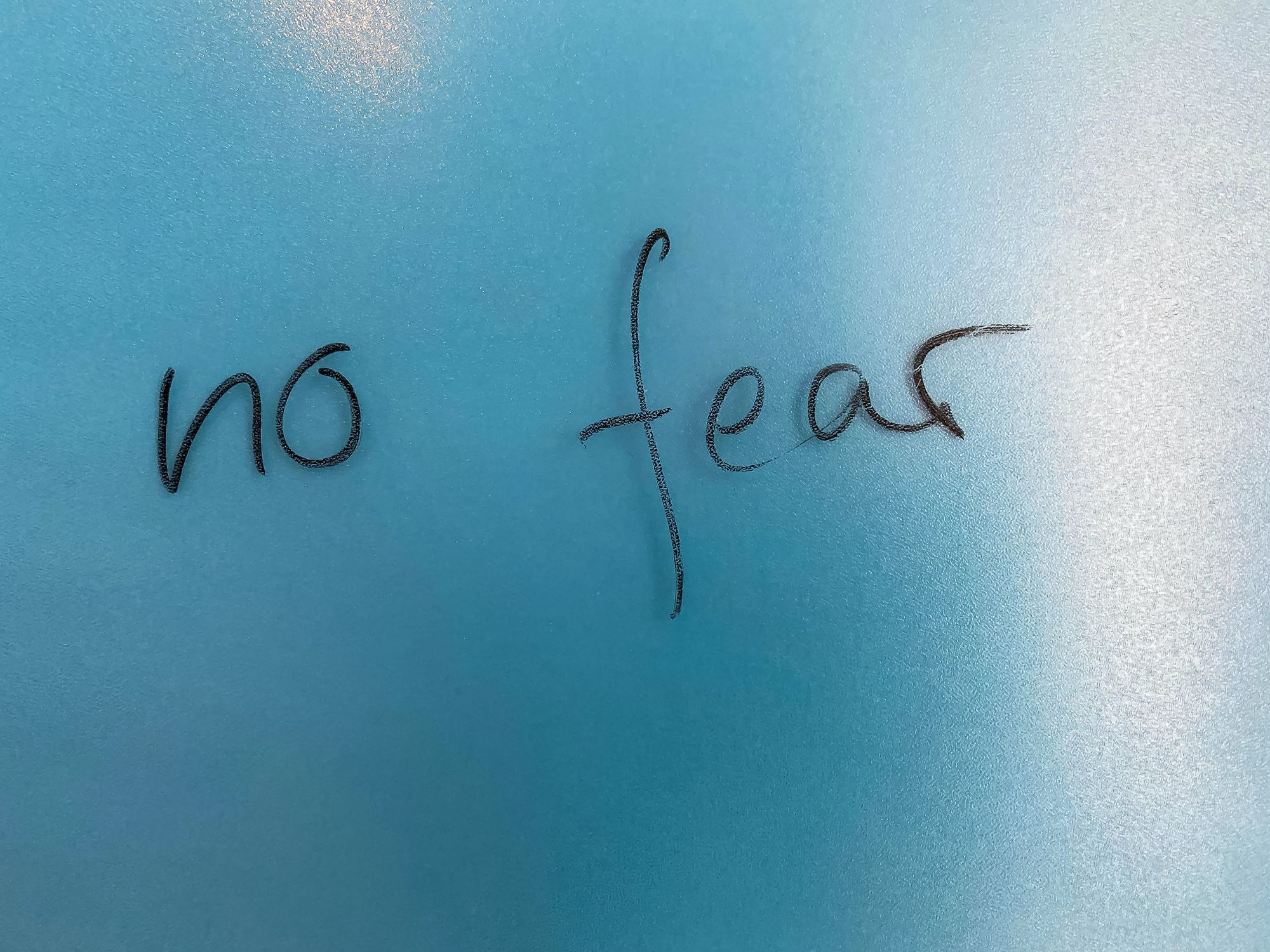7 Strategies to Stop Fear-Based Decision-Making
Fear-based decision-making leads to over-packed schedules, commitments you don't want, and burnout. Learn 7 strategies to stop it!

Are you completely overwhelmed? Is your calendar is out of control and you can't seem to catch up? You might be asking yourself, "how did my life get like this...?"
No one ends up in this state on purpose. There are many different reasons why you feel completely overwhelmed and one of the big reasons is fear-based decision-making.
What is fear-based decision-making?
Fear-based decision-making happens when you make decisions based on being afraid of a potential outcome. These decisions compound one another into what becomes an impossible cycle of trying to plug all the holes before the dam breaks. You might strike a delicate balance for a short time, but eventually, the dam will break. I have witnessed the deluge in my consulting sessions many times.
In a word: burnout!
But! It is never too late to mop up the water and shore up the dam, stronger and better than ever.
5 types of fear-based motivators
The common threads I see most often that lead to fear-based decisions include:
- Fear of missing out on money
- Fear of missing out on a connection
- Fear of not being liked (aka people-pleasing)
- Fear of conflict
- Fear of judgement
At their core, each of these leads to fear-based decision-making. You decide to do something not because it’s something you want, but because you are afraid of what will happen if you don’t. Or vice-versa, you decide not to do something because you are afraid of what will happen if you do.
Either scenario is a problem because there is a real cost to you. One way or another, these decisions are usually at your expense in time, energy, values, or experience. Not great for you or your business.
Let’s dig a little deeper into 5 fear-based motivators:

1. Fear of missing out on money
This is connected to a scarcity mindset (first coined by Stephen Covey in his book, The 7 Habits of Highly Effective People). This is the belief that there isn’t enough (money, projects, opportunities etc.) to go around. For entrepreneurs, it's often the fear that if you don’t say yes to a meeting or project immediately, the person asking might go somewhere else in the meantime and, even if it isn’t a good fit for you, you are missing out on the money.
2. Fear of missing out on a connection
Filling your calendar with a million networking events for fear that you miss out on some random connection that will result in a future opportunity...yep I have indeed fallen victim to this one. The result is always, “Hrm, why I am burnt out...”, after 17 days in a row of full workdays and evening commitments and an uncontrollable schedule.
3. Fear of not being liked
Saying yes to something because you are afraid of disappointing someone or of not being liked. Classic people-pleasing behaviour. It is so ingrained (women in particular) that you often don’t even realize you are doing it. You often say yes to things because you want to be seen as helpful and likable, instead of actually wanting to do them.
4. Fear of conflict
Whether it is keeping an employee that isn’t working out for WAY TOO LONG, not pushing back on a client request you don’t agree with, or accepting the 7th meeting invite for a day because you don’t want to rock the boat. These are all potential sources of conflict.
Firing someone is uncomfortable. Telling a client you don’t agree with them is uncomfortable. Asking someone to adjust a meeting time is uncomfortable. It’s easier in the moment to not take action or just go along with something.
5. Fear of judgement
This last one sneaks in as a fear that stops you from doing things you want to do. It prevents you from doing something that you want because you are afraid of being judged poorly or that you will be embarrassed or shamed. It’s being afraid of what other people might think about you.
7 strategies to stop fear-based decision-making
The consequences of fear-based decision-making are being completely overwhelmed, stuck in a guilt spiral, having an out-of-control schedule, and missing out on experiences.
Fortunately, it doesn’t have to be this way!
Here are 7 strategies to stop fear-based decision-making:
1. Notice when you are making a decision based on fear
If you don’t know you are doing it, you can’t stop it from happening. Reflect on some of your recent decisions. Think about:
- Things you are working on that you are not enjoying.
- Things that are important to you but you haven’t been able to put time towards.
- Events or projects that are coming up that you are not looking forward to.
- Emotions that come up when you think about saying no or cancelling a commitment you made.
- Emotions that come up when you think about trying something new.
Now ask yourself:
- Have you committed to a project you didn’t want because you were worried about the financial impact?
- Did you accept a meeting when you didn’t have time because you were worried that if you said no (or asked for it to be at a later date) the person requesting the meeting would dislike you?
- Did you not try something because you were afraid you would look foolish?
- What decisions brought you to this point?
As you reflect, you might be noticing some of the fear motivators I mentioned above.
Once you are aware that you are making fear-based decisions, it is easier to notice. What you can work on now is trying to catch yourself before you make a decision and think about what is motivating it.
It’s also easier to look at the decisions you have already made and re-evaluate them. Most things are not set in stone and you are allowed to change your mind.
Awareness of a fear-based decision is the first step towards changing it!

2. Acknowledge your agency
Once you can notice when you are about to make a fear-based decision, you can take the next step, which is acknowledging your agency. Your schedule gets out of control because of your decisions. It can also get under control because of your decisions. You choose what you commit to. You have the power to say no (or yes) to things, not just let them happen because of what-ifs and imagined consequences.
Think about how you are running your projects and time right now versus how you WANT to be running them.
- What are the changes you would have to make to get your schedule under control?
- What are the hard and soft boundaries you need to set to make it possible?
- How will you communicate those boundaries to clients, colleagues, and the other people in your life?
For example, these are some of my boundaries around when I take meetings:
- Hard boundary: I rarely take meetings on Fridays. I keep Fridays open as a day to catch up on things I wasn’t able to do earlier in the week or work on things that are important, but not urgent, so I am always making progress on my goals. This hard boundary sets me up to have a relaxing weekend where I am not worrying about work. I simply don't include it in my calendar availability.
- Soft boundary: I prefer to do deep thinking work in the mornings which means I prefer to take meetings in the afternoon. Based on my energy cycles, this is what works best for me so I always suggest meeting times in the mid to late afternoon and try to protect my morning time. That said, I sometimes work with people in timezones that make morning meetings a requirement.
3. Acknowledge the impact on yourself
Part of owning your agency is acknowledging that by putting yourself last you put yourself in a negative place. You sacrifice time, energy, money, and potential experiences by letting these fears be the driver for your decisions.
What if you were calm? What if your schedule felt manageable? What if you were well-rested and energized?
Self-care is a competitive advantage. Setting boundaries and being intentional about what you commit to is a huge part of that. You can’t be creative, innovative, or productive when you are overwhelmed and exhausted. Nor can you be the person you want to be for yourself, your family, your friends, or your clients.
A healthy business requires a healthy entrepreneur.

4. Practice saying no (or not now)
A huge part of owning your agency and not letting fear be a driver for your decisions is to practice saying no (or not now). I wrote a whole other post on obligation elimination and the power of saying no.
You can determine what to say no to by getting clarity on what you get out of whatever you are committing to. This clarity is understanding what your motivators are. Ask yourself:
- What made me decide to agree to this project/event/commitment?
- What do I get out of it?
- What would happen if I cancelled or postponed?
Putting yourself first is going to feel uncomfortable. Saying no (or not now) is going to feel uncomfortable. But give it a try. Like building a muscle, the more you do it, the easier it becomes to say no to things that don’t align with your available time, energy or goals.
5. Flip the script
Do you have a hard time saying no or not now? Imagine what you would think if you were the person asking for whatever commitment you are considering.
Flip the script and ask yourself:
- Would you think less of someone if they told you that their schedule was full and they were taking meetings in 3 weeks?
- Would you be upset with someone if they said they couldn’t start a project for 2 months?
- Would it be a big deal if someone told you that they were no longer available to go to your event?
Not likely. You are a reasonable, kind person, likely dealing with other reasonable, kind people. Instead of building up other people’s responses in your mind, ask them!

6. Calm your existing schedule
If your existing schedule is out of control and you know you have made some fear-based decisions, start by reviewing your current schedule and commitments.
- Is there anything you have already committed to that you can either eliminate or reschedule?
- Consider how each commitment impacts the others. For example, if you move a few meetings to next week, are you just making next week a big mess?
- Consider whether they are in alignment with your goals and values, not just someone else’s. It’s absolutely ok to make the choice to help someone else out, but you need to be aware of the consequences of that choice and how it impacts you.
Remember, most things are flexible. Depending on your business or role, there is often wiggle room to push something back or ask for an extension. Life happens to all of us, you included. You are allowed to make adjustments.
7. Commit with intention
When you consider new commitments, be thoughtful and reflective about your motivators. You can make informed, intentional decisions.
Ask questions like:
- Why should I commit to this project or event?
- Is the money I will earn worth the headache?
- How does this impact my schedule?
- Is this project or event in alignment with my goals?
- Is this project or event in alignment with my values?
Knowing the answers to these questions will help guide your decision-making away from fear-based motivators.

Be kind to yourself
Above all, choose to be kind to yourself. You can’t please everyone all the time. Full stop. You are allowed to be imperfect. You are allowed to rest. You are allowed to say no, even if it isn’t what someone else wants. Choose YOU and work on letting go of those fears.
Need help getting your overwhelm under control? I provide one-on-one productivity consulting to do just that. Get in touch!
Share
Ashley Janssen

Productivity consultant, writer, speaker, serial entrepreneur, chaos calmer, introvert, cat-lady. Lover of books, fitness, old fashioned’s, basketball, and video games.
Follow me on
Twitter
or
LinkedIn.
Hire me for
1 on 1 productivity consulting
or
speaking.
Related articles

Why Are You Productive For "Only" 5-6 Hours Each Day?

What It Really Means To Be Calm


Comments ()